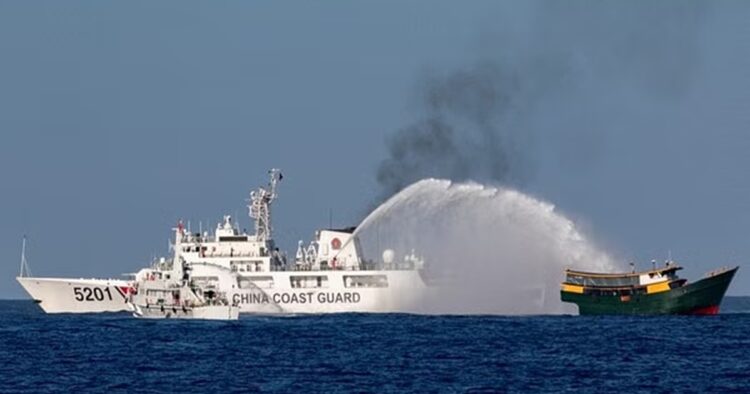The Philippines has voiced its strong objection to China following a recent incident in the South China Sea. On Thursday, Manila summoned a senior Chinese envoy to register a protest against an episode where two Philippine vessels were damaged by a water cannon during a patrol near the disputed Scarborough Shoal.
The incident occurred on April 30, when a Coast Guard vessel and another government boat were damaged, according to the Philippines’ foreign ministry.
This adds to the longstanding territorial disputes between Manila and Beijing in the South China Sea, where both countries have been involved in numerous maritime incidents in recent times.
The altercation near Scarborough Shoal transpired during a mission aimed at resupplying Filipino fishermen operating in the area. The Philippines accused China’s Coast Guard and Maritime Militia vessels of engaging in aggressive actions, including harassment, ramming, and dangerous maneuvers, besides the use of water cannons.
Manila emphasized that China’s water cannon use in this incident was particularly forceful, causing damage to the Philippine vessels. The foreign ministry demanded the immediate withdrawal of Chinese boats from the shoal and its surrounding areas.
This diplomatic protest marks the 20th complaint filed by Manila this year alone, and the 153rd since President Ferdinand Marcos assumed office in mid-2022. Despite these protests, the Chinese embassy has yet to respond to Manila’s concerns regarding the incident.
China’s claim over almost the entire South China Sea disregards competing claims from neighboring nations, including the Philippines, and disregards an international ruling that deems its assertion unlawful.
Scarborough Shoal, located 240 kilometers west of Luzon, the main island of the Philippines, has been a contentious area since China seized it in 2012.
Following the seizure, China has deployed its coast guard and other vessels around the shoal, impeding Philippine ships and fishermen from accessing its resources. This latest incident underscores the ongoing tensions in the region amid China’s assertive maritime policies.
The timing of this altercation coincides with a major annual military exercise conducted by the Philippines and the United States, which has drawn criticism from Beijing. The Philippines and the US have a mutual defense treaty, and recent confrontations between Philippine and Chinese vessels have raised questions about the treaty’s activation.
President Marcos previously stated that US Defense Secretary Lloyd Austin assured him of invoking the treaty if a Filipino soldier were harmed by a “foreign power.”
This underscores the complex geopolitical dynamics at play in the South China Sea, where regional powers navigate competing interests amidst escalating tensions.

















Comments